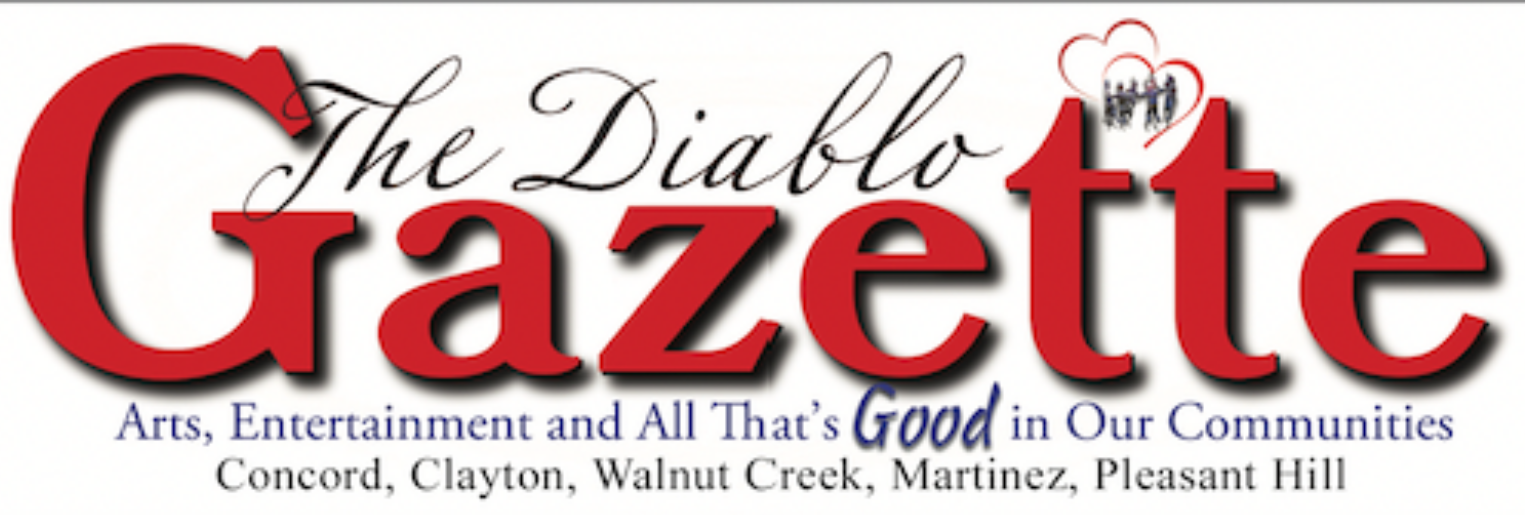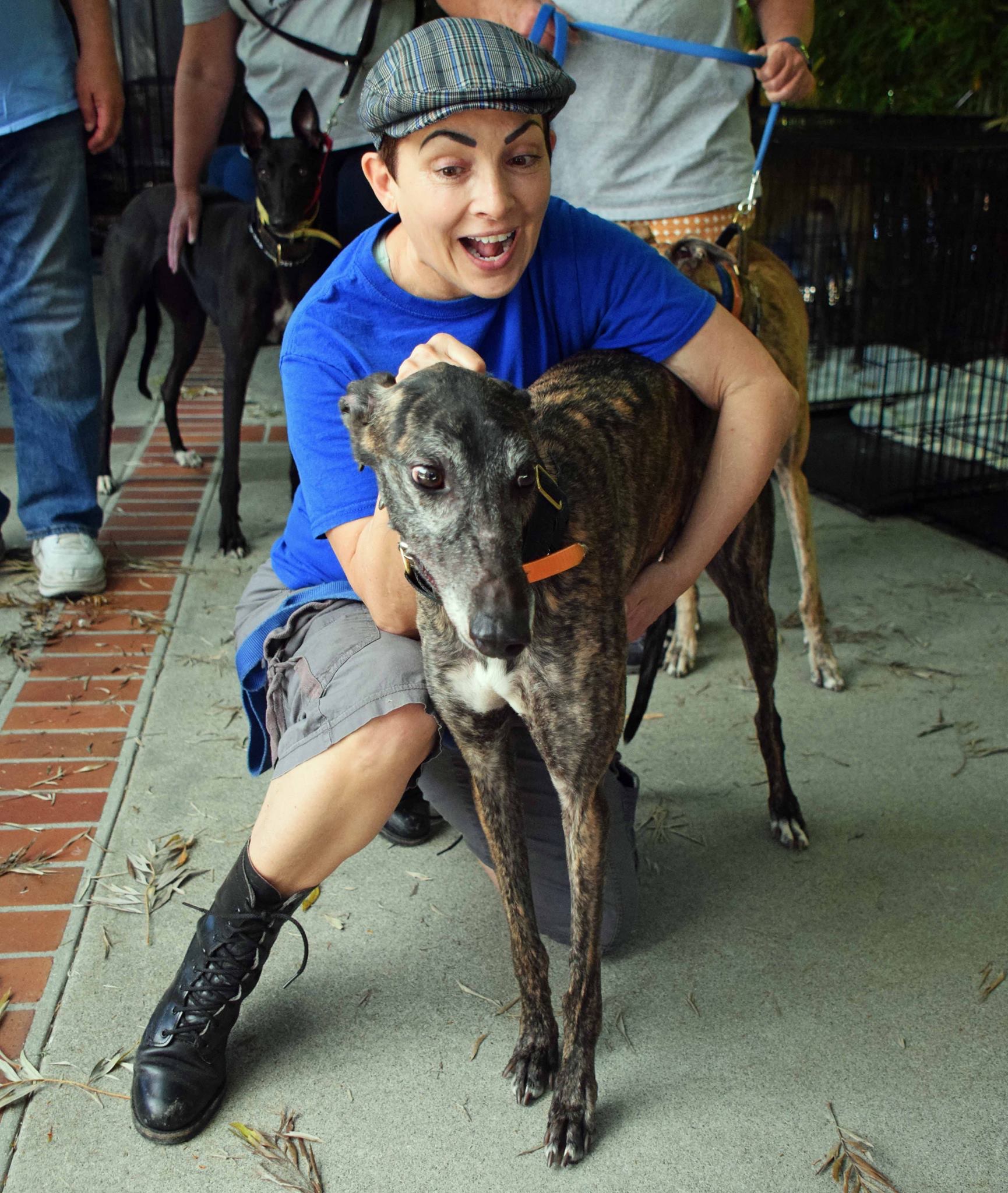
By Jill Hedgecock
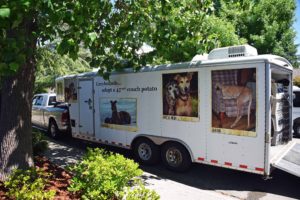 On May 12, 2018, Heather Weir drove into Walnut Creek with a trailer filled with 27 greyhounds rescued from a Florida racetrack. Their arrival marked the end of the second leg of their journey, a 25 hour-trek from Heather’s Colorado home. More than 30 volunteers cheered and applauded to welcome Heather and the retired racing dogs she’d rescued. Over the last few weeks, Weir, a veterinarian, had assessed the animal’s health upon arrival from Florida, spayed and neutered the dogs, and reviewed applications of potential California adopters.
On May 12, 2018, Heather Weir drove into Walnut Creek with a trailer filled with 27 greyhounds rescued from a Florida racetrack. Their arrival marked the end of the second leg of their journey, a 25 hour-trek from Heather’s Colorado home. More than 30 volunteers cheered and applauded to welcome Heather and the retired racing dogs she’d rescued. Over the last few weeks, Weir, a veterinarian, had assessed the animal’s health upon arrival from Florida, spayed and neutered the dogs, and reviewed applications of potential California adopters.
These greyhounds are lucky pups. Many racing dogs experience track accidents that result in injury or death. A constitutional amendment is on the November ballot to phase out racing in Florida that could change all that. Until then, Stuart Homer and wife, Barbara, founders of Walnut Creek-based Golden State Greyhound Adoption (GSGA), will help retired dogs find homes.
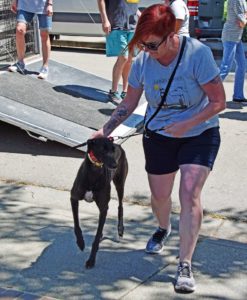
Today was a landmark day for GSGA because Hijinx was their 1,800th rescue. It was a fitting coincidence that Hijinx was a sleek black racer because Barbara Homer is particularly drawn to black dogs. She became interested in greyhounds in 1991 when she read an article about these animals in People magazine, but it wasn’t until 2002 that she and Stuart started the rescue.

Stuart and Barbara’s years of experience have perfected the haul day routine that brings 120+ greyhounds into the Bay Area every year. Dedicated volunteers first unloaded the dogs one at a time, then guided them into a pre-labeled crate. The dogs were fed, watered and pottied. Because greyhounds are taught to chase a squeaky lure, they may not be compatible with small pets so next came cat and small-dog testing, followed by photography and bathing. All volunteers were instructed to remain quiet during this phase of intake. It might seem like an impossible challenge to keep so many people silenced, but most were seasoned volunteers and experienced greyhound owners. Leslie DeLange, whose job as a runner was to take dogs to the various stations, adopted her first greyhound in 2008. Jim Shattuck (a three-time greyhound adopter) has been volunteering for GSGA for 4 years and came to transport overflow animals to Auburn, a safe haven for up to 60 dogs awaiting adoption.
Guitarist and singer Jane Weidlin of the 1980s hit band the Go-Gos returned to volunteer as a runner for GSGA after a two-year hiatus. She adopted her first greyhound 16 years ago. Although she’s adopted other breeds, “Greyhounds are the easiest dog to own,” says Weidlin.
Duane Caldwell has been the official GSGA photographer for the last 4 years.
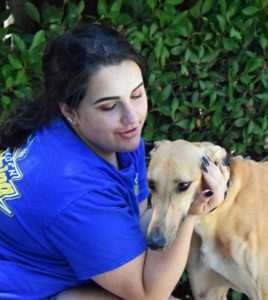 “They make great therapy dogs,” says Caldwell who organizes weekly dog walks for fellow greyhound owners in San Jose. “I love the emotional intelligence of the breed.”
“They make great therapy dogs,” says Caldwell who organizes weekly dog walks for fellow greyhound owners in San Jose. “I love the emotional intelligence of the breed.”
Despite all the activity around these dogs, only an occasional whine interrupted the silence. A tendency not to bark is one of the many perks of this breed. Retired racers are generally low-maintenance. They require minimal grooming and only low to moderate exercise. They are calm, gentle, intelligent and adaptable. However, these former racing dogs are not suitable for all homes. They have been trained to chase moving objects and will bolt through doors. When outdoors, they must be kept on a leash or within a fenced yard at all times. They do not come housebroken, are poor swimmers, can be prone to sunburn, require soft bedding, and need to live indoors. That said, they make great family pets with well-mannered children, tend to be healthy, and have an average life expectancy of 12 years.
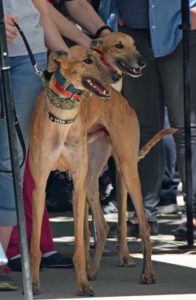 While some haul dogs were assigned to temporary fosters, 12 dogs were headed to forever homes. A house visit and an interview of the adopter’s lifestyle and home life are part of the process. First-time adopters showed up for orientation 2½ hours after arrival to find out what dog they’d been paired with. New owners were debriefed, signed contracts, and paid the $300 adoption fee. Repeat adopters like Lisa Alexander who’d taken home her first greyhound from the very first GSGA haul were thrilled to meet her new dog, Carpet (renamed Mini). First-time adopters, David Franco and his two children, Andy and Lily, were excited about their new pet. Andy piped up that he liked greyhounds because “they chase rabbits.”
While some haul dogs were assigned to temporary fosters, 12 dogs were headed to forever homes. A house visit and an interview of the adopter’s lifestyle and home life are part of the process. First-time adopters showed up for orientation 2½ hours after arrival to find out what dog they’d been paired with. New owners were debriefed, signed contracts, and paid the $300 adoption fee. Repeat adopters like Lisa Alexander who’d taken home her first greyhound from the very first GSGA haul were thrilled to meet her new dog, Carpet (renamed Mini). First-time adopters, David Franco and his two children, Andy and Lily, were excited about their new pet. Andy piped up that he liked greyhounds because “they chase rabbits.”
GSGA is an all-volunteer non-profit organization. Because adoption fees don’t cover the veterinary care and other costs to run the rescue, GSGA runs an annual picnic/auction fundraiser to subsidize the adoptions. Tax-deductible donations can also be made online at http://www.goldengreyhounds.com/donations/index.htm or checks can be sent to UPS Store, at GSGA, PMB 182 2977 Ygnacio Valley Road, Walnut Creek, CA 94598. Those interested in adopting a greyhound should fill out an application at http://www.goldengreyhounds.com/adopt/#onlineform.
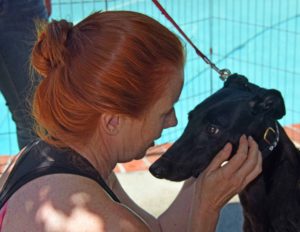
By Jill Hedgecock is Program Coordinator, Mount Diablo branch of the California Writers Club. www.jillhedgecock.com
